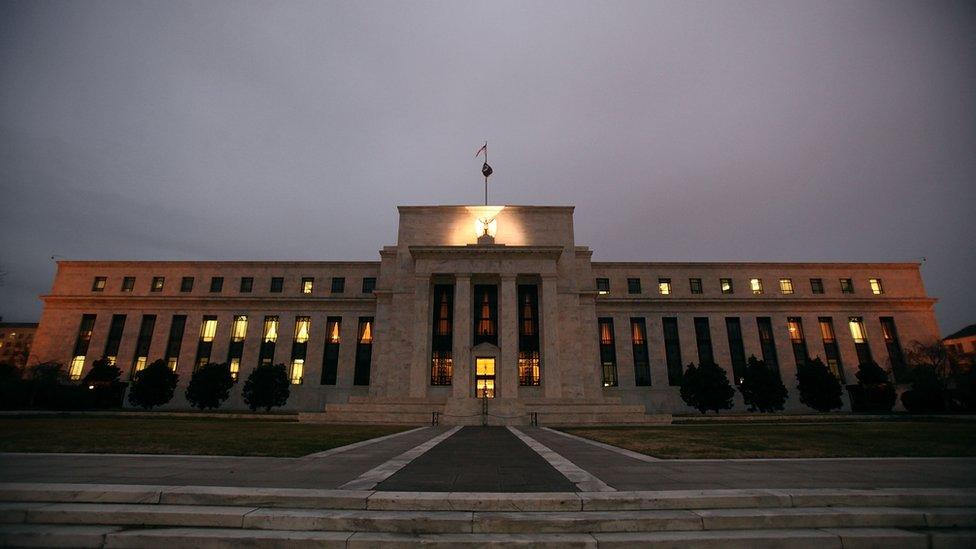Wall Street sinks as China turmoil hits global shares
- Published
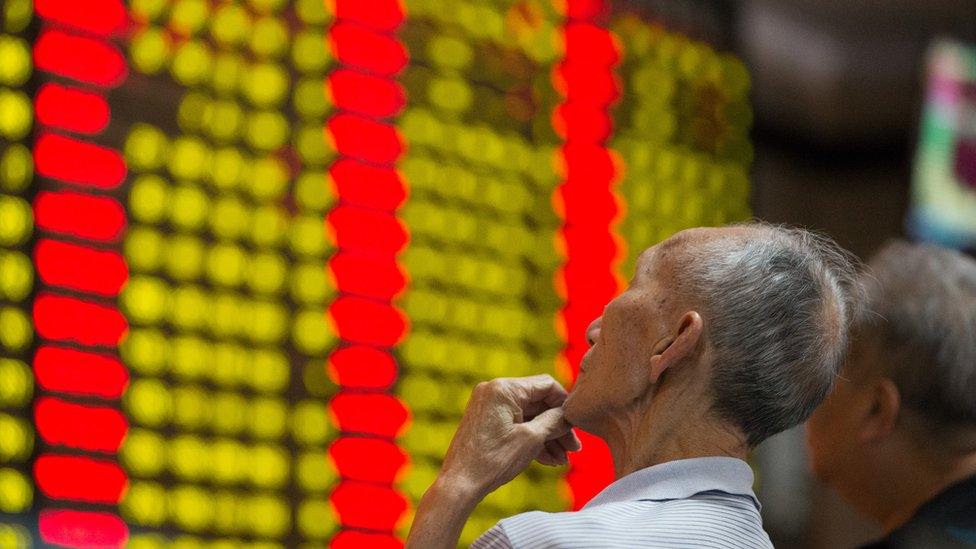
Wall Street shares closed sharply down after the suspension of trading on Chinese markets for the second time this week spread alarm among investors.
After Asian and then European stock markets fell, Wall Street's Dow Jones and S&P 500 indexes shed 2.3%.
Earlier, circuit-breakers triggered a suspension in Chinese trading following a 7% fall in the country's main index.
Later on Thursday, the Chinese authorities said they were suspending the circuit-breaker system.
The mechanism was brought in late last year to reduce volatility on China's markets and had not been triggered until this week. It will be lifted from Friday.
The slump on Chinese markets prompted renewed panic on global markets. Share dealing was halted in the first 30 minutes, making it China's shortest trading day on record.
The FTSE 100 share index in London closed down 2% at 5,954.08.
Germany's Dax, down 2.3% at 9,979.85, while France's Cac 40 fell 1.7% to 4,403.58.
On Wall Street, banks were among the biggest casualties, with giants Citigroup and Morgan Stanley falling 5%.
Technology stocks were also hit. Apple slid 4.2%, Amazon 3.9%, Facebook 4.9% and Google parent Alphabet 2.3%.
The tech-rich Nasdaq index closed down 3%.
Nerves
Amid the uncertainty, the euro gained nearly a cent against the dollar, rising to $1.0870.

What does this mean for the rest of the world?
The direct financial impact of lower share prices in China is moderate. There is not enough foreign investment in the Chinese market for it to be a major problem. The London consultancy Capital Economics has said foreigners own just 2% of shares.
The issue is more about whether the financial turbulence shines a light on wider issues about the economic slowdown in China: is the economy heading for what's called a "hard landing", too sharp a slowdown?
China is now such a big force in the global economy that it would inevitably affect the rest of the world. It is the second largest economy and the second largest importer of both goods and commercial services.
Read more from Andrew Walker, BBC World Service Economics Correspondent

The pound fell against the euro by more than a cent and a half, to €1.3408.
Investors are nervous after the Chinese central bank moved to weaken the country's currency, the yuan, for the eighth day running, sparking fears of a currency war.
This move is designed to boost exports by making Chinese goods cheaper outside the country, analysts have speculated.
It is also being interpreted as an indication that consumer demand in China may be slowing more sharply than feared.
Official economic growth in China is still running at just below 7%.
But moves to devalue the yuan suggest attempts to shift the economy from an export-led one to a consumer and services-led one are running into problems.
Soros warning
Legendary US billionaire investor George Soros has warned that 2016 could see a global financial crisis on as big a scale as that seen just eight years ago.
Giving a speech to an economic forum in Sri Lanka, Mr Soros said China faced a " major adjustment problem."
He added: "I would say it amounts to a crisis. When I look at the financial markets there is a serious challenge which reminds me of the crisis we had in 2008, according to Bloomberg., external
It is not the first time the billionaire hedge fund manager has warned of impending doom on the financial markets. In 2011 he warned the Greek debt crisis that consumed Europe was more serious than the 2008 financial crisis.

Analysis: Karishma Vaswani, Asia business correspondent
If at first you don't succeed - try and try again.
Or maybe you don't. Especially if panic breaks out on your stock markets for a second day this week.
The decision by China's regulators to suspend the brand new circuit-breaker mechanism - which only came into effect this week - tells you just how difficult it is to manage or control financial markets.
But perhaps that's the point.
Meddling in markets can only lead to misery - at least, that's certainly what many in China's financial circles may now be thinking.

After the trading halt, the China Securities Regulatory Commission announced that major shareholders could not sell more than 1% of a company's shares within three months as of 9 January.
It comes as a previous six-month ban of stock sales by major shareholders is set to expire on Friday.

Why is this happening now?
China's central bank began to devalue the yuan last year. Also, a World Bank report has highlighted weaknesses in China's economy. Buffeted by events in China, world stock markets are also being hit by oil prices falling to a 14-year-low.
Should we be worried?
China is responsible for 17% of all the world's economic activity, so any downturn in spending there affects the rest of the world.
Exporters to China could be hit hard as China is a key buyer of industrial commodities such as oil, copper and iron ore.
What happens next?
There is now a lot more pressure on other Asian countries to depreciate their currencies in response to China's move.
China's attempts to impose circuit breakers with a 7% threshold appear to have only added to the panic. On Wall Street, circuit breakers kick in at 20%.
Amy Zhuang, a China analyst with Nordea Bank, told the BBC she expected "a rush selling" as soon as Chinese markets opened on Friday.

Bernard Aw, market strategist at trading firm IG, said the negative sentiment was because of the perception that China may further weaken the yuan, igniting concerns over what that might mean for other economies.
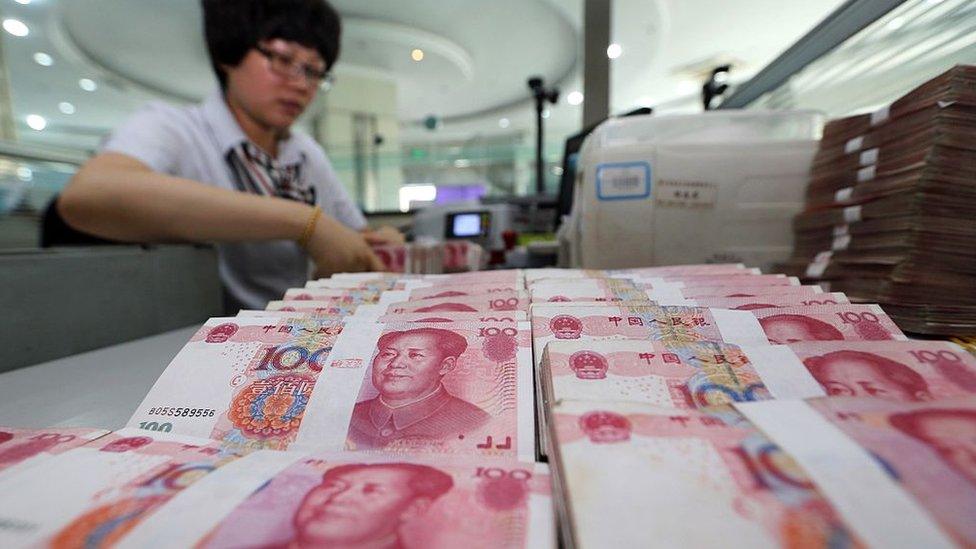
The depreciation of the yuan has put pressure on other Asian countries to devalue their currencies to stay competitive with China on exports
A weakening of the currency is often seen by investors as an indication that that the economy is not doing well and needs to be propped up by boosting exports.
A lower yuan makes the cost of exporting goods for Chinese companies cheaper, giving the slowing factory sector a boost.

What are China's 'circuit-breakers'?
The measures were announced in December after a summer of dramatic market losses - used for the first time time on Monday and again on Thursday
They automatically stop trading in stock markets that drop or appreciate too sharply - a 15-minute break if the CSI 300 Index moves 5% from the market's previous close, or a whole-day halt if it moves 7% or more.
Supposedly introduced to limit panic buying and selling - which is more likely in small investor-dominated markets like China's - but critics say they only add to selling pressure the next day.

After disappointing manufacturing data on Monday, the mainland benchmark index plunged 7%, triggering a global equities sell-off.
The negative sentiment spilled over the border to Hong Kong, where the Hang Seng index also lost 3%, closing at 20,333.34 points.
Japan's Nikkei 225 index finished down 2.3% to 17,767.34, while Australia's S&P/ASX 200 index lost 2.2% to 5,010.30 as energy shares dragged down the market.
- Published7 January 2016
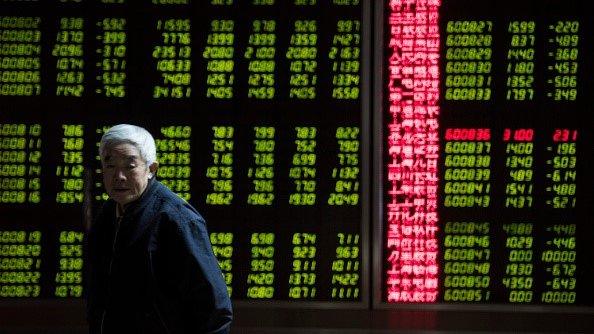
- Published7 January 2016
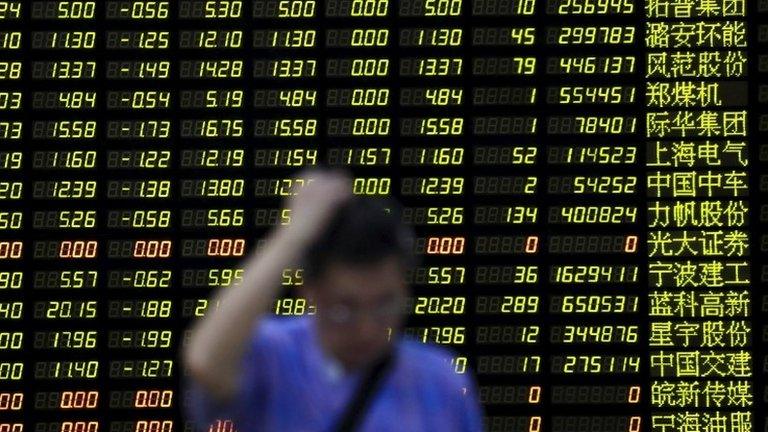
- Published7 January 2016
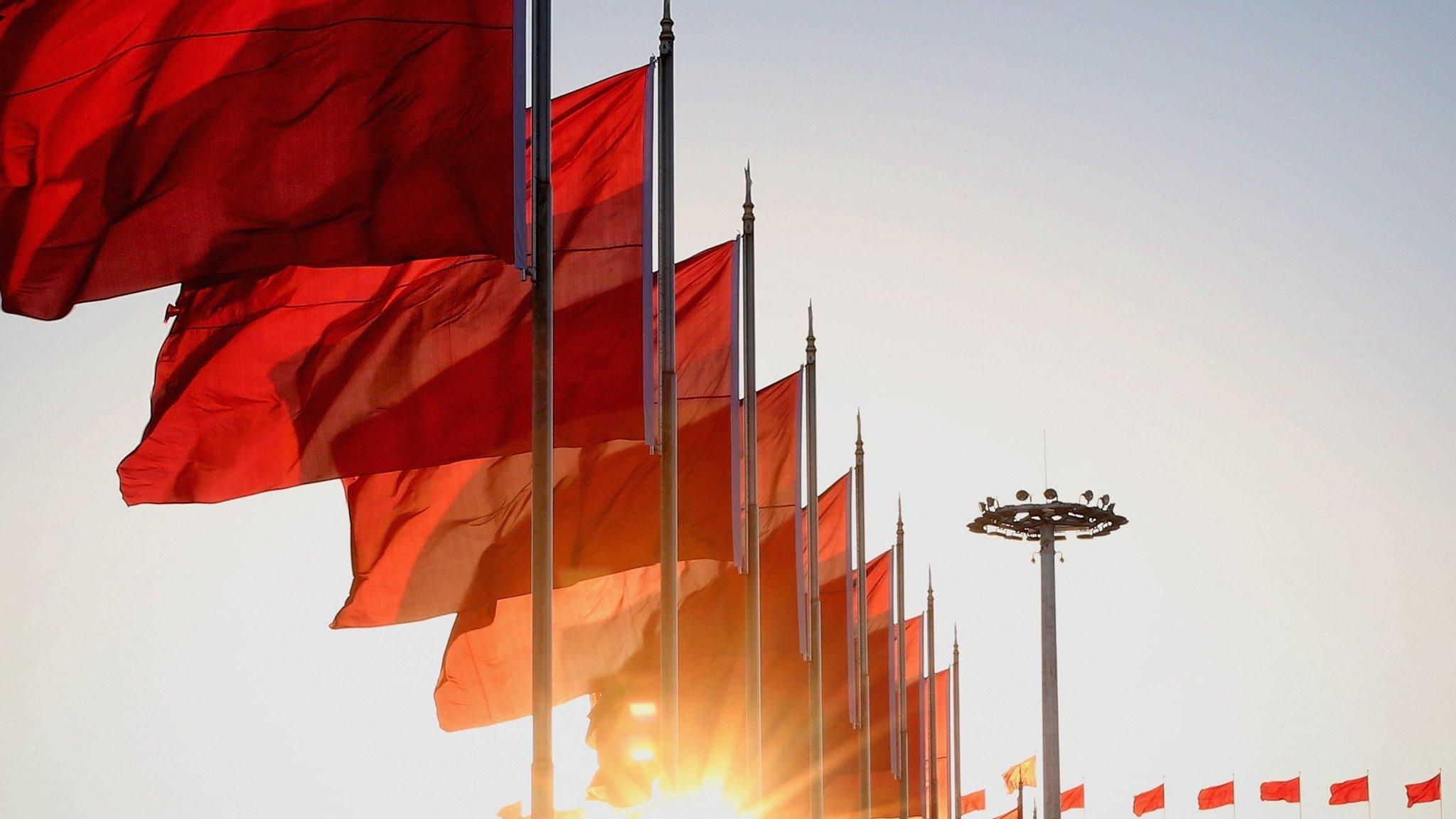
- Published6 January 2016
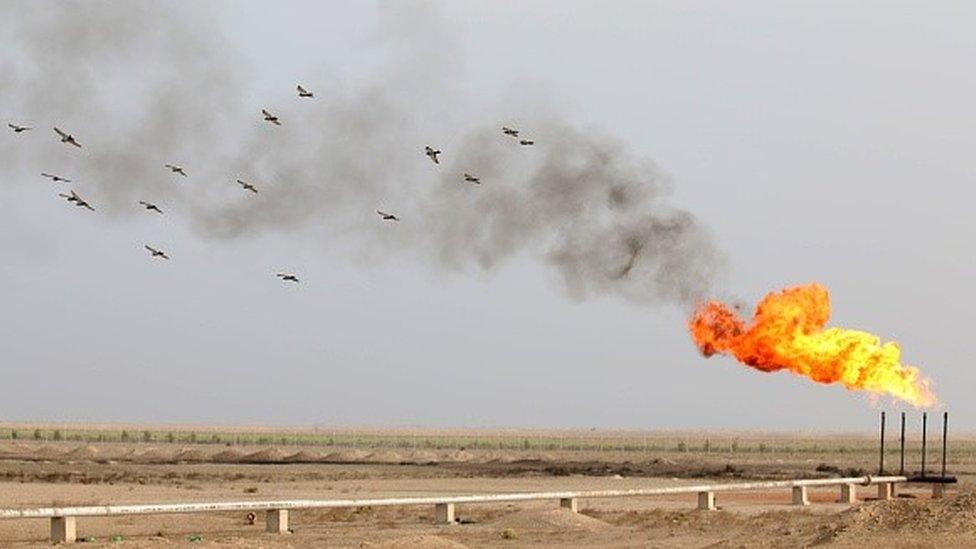
- Published6 January 2016
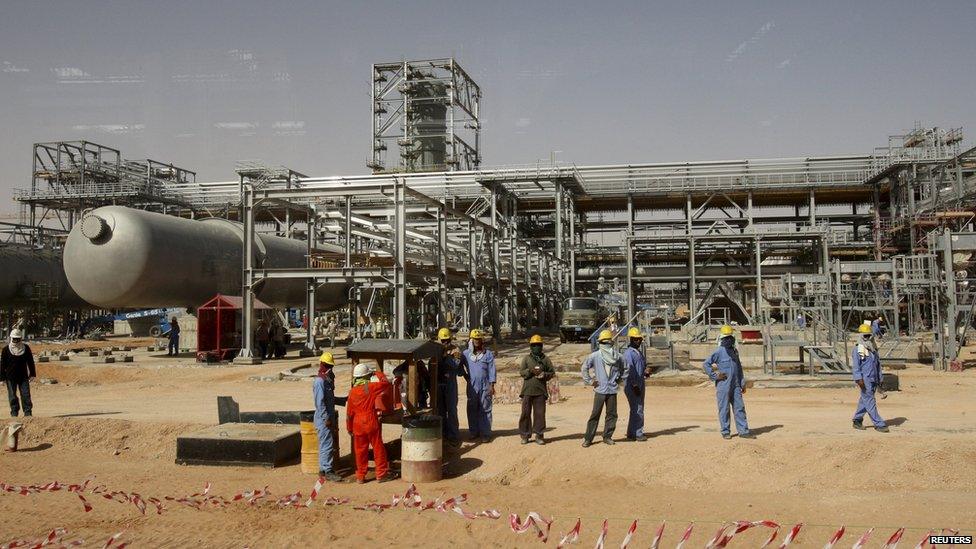
- Published6 January 2016
